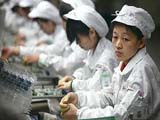The Fair Apple
Post Views 0
The investigation, initiated by Apple came in the wake of widespread criticism following worker deaths, including suicides, and injuries at the Chinese factories.
Foxconn, on which nearly all leading high-tech companies in the United States rely on to produce their most popular gadgets, including Apple’s iPad, Microsoft’s Xbox gaming console and personal computers from Dell and Hewlett-Packard, said it would improve pay and working conditions in its Chinese factories, a move that could lead to higher costs for U.S. firms.
Fair Labor Association’s investigation unearthed multiple violations of labor law, including extreme hours and unpaid overtime. The report said that more than half of 35,500 randomly selected employees at Foxconn’s assembly plants for Apple exceeded the company’s limit of 60 hours of work a week. The labor group also reported hazardous working conditions that put lives at risk.
The nearly month long investigation one of the largest investigations ever conducted of a U.S. company’s operations abroad.
Dominant as they are in the global technology industry economy, the newly forged accord between Apple, the world’s most valuable corporation and Foxconn, China’s biggest private-sector employer will hopefully have a ripple effect across the sector. Working conditions at most other Chinese manufacturers are considerable inferior to those at Foxconn.
The FLA audit had found that during peak production times, workers in the three factories put in more than 60 hours per week on average. Foxconn has committed to maintaining total compensation to workers while reducing working hours to 49 hours per week, inclusive of overtime.
Foxconn will be hiring tens of thousands of additional workers, as well as building more infrastructure to compensate for the reduced working hours.
Consequent higher prices for consumers are likely but limited, since labor costs are only a small fraction of the total cost of most high-tech devices.
Many critics consider Foxconn’s commitment to comply with Chinese legal limits and Fair Labor Assn. standards on working hours by July 2013 too lengthy. Taren Stinebrickner-Kauffman, executive director of SumOfUs, a corporate accountability group inWashington, D.C. says, “I’m not saying it’s flip-a-switch easy, but if it were a priority it would happen a lot faster than that.”
Apple in the meantime has come out with a statement fully supporting all recommendations by investigating agencies. “We think empowering workers and helping them understand their rights is essential.”
Human right groups are increasingly being outspoken regarding the monster profits that Apple is reaping on the backs of Chinese workers who manufacture its products for low pay in plants that don’t even meet basic health and safety requirements.
Stinebrickner-Kauffman is of the opinion that an investigation was not needed in the first place. “Until we actually see workers’ lives getting better, we can’t assume this is going to lead anywhere.”
Interestingly, despite the high-profile criticism, consumers and investors haven’t been deterred from supporting Apple.
“Nobody has stopped buying these phones, and it’s also the largest valuation of any company on a U.S.-listed exchange, so it hasn’t stopped investors from buying the stock,” Colin Gillis, a tech analyst at BGC Partners said.
The Fair Apple by Harrison Barnes

